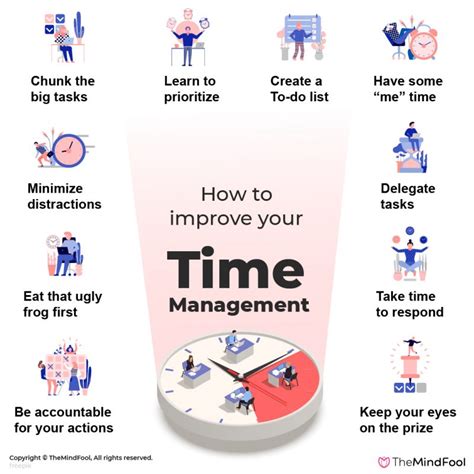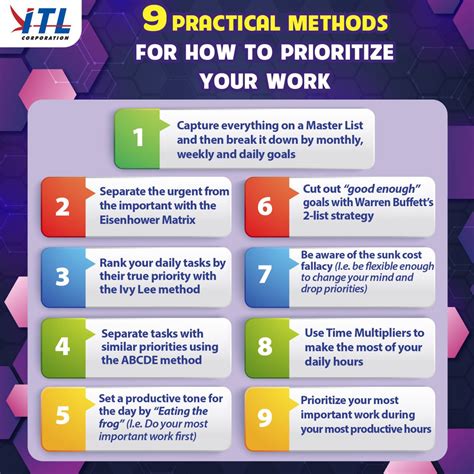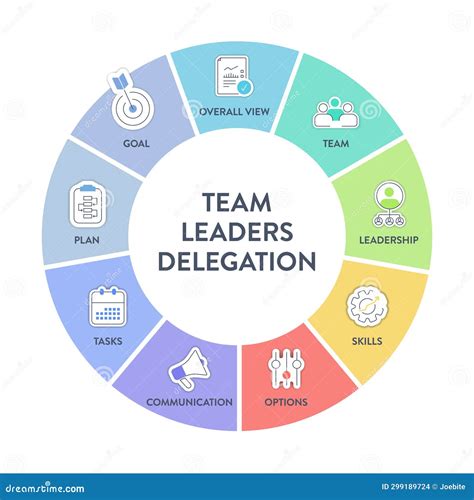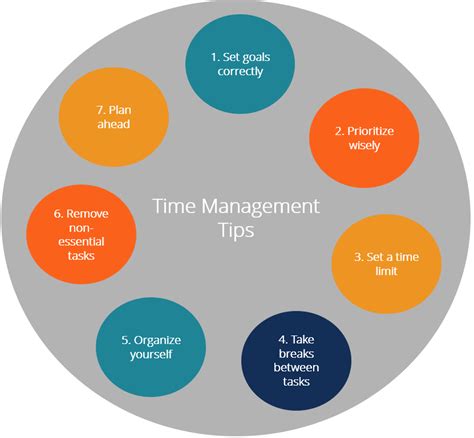Are you constantly feeling overwhelmed and struggling to keep up with your daily tasks? Do you find yourself wishing for a few extra hours in the day to accomplish everything on your to-do list? If so, it's time to take control of your time and boost your productivity to new heights.
In today's fast-paced world, effective time management has become a critical skill for success in both personal and professional lives. By implementing strategic techniques and employing innovative approaches, you can streamline your workflow, increase your focus, and achieve your goals with greater ease.
One powerful method for mastering your time is by embracing the concept of prioritization. By identifying the most important tasks and giving them the attention they deserve, you can ensure that you are making the most of your limited resources. Whether it's through the use of to-do lists, daily planners, or digital task management tools, finding a system that works for you is crucial for staying organized.
Increase Your Concentration to Enhance Time Management Efficiency

Enhancing your ability to concentrate is a key factor in improving your efficiency in managing time effectively. By sharpening your focus and eliminating distractions, you can make the most out of your productive hours. This section explores strategies and techniques that can help you increase your concentration and optimize your time management skills.
1. Practice Mindfulness: Cultivating mindfulness is essential for increasing concentration. By fully engaging in the present moment, you can minimize mental clutter and distractions that hinder your productivity. Developing a regular mindfulness practice, such as meditation or deep breathing exercises, can help you stay focused on tasks at hand.
2. Create a Distraction-Free Environment: Minimize external distractions by setting up a dedicated workspace free from unnecessary interruptions. Reduce noise, keep your workspace organized, and remove any tempting distractions such as social media notifications and irrelevant websites to maintain your concentration and maximize productivity.
3. Break Tasks into Manageable Chunks: When faced with complex or overwhelming tasks, breaking them down into smaller, more manageable chunks can boost your concentration and prevent procrastination. By tackling one task at a time, you can maintain focus and complete each part efficiently, leading to overall improved time management.
4. Utilize Time Blocking Technique: Time blocking involves scheduling specific blocks of time for certain tasks or activities. By assigning dedicated time slots for different types of work, you can improve focus and ensure that each task receives the necessary attention. This technique helps you avoid multitasking and enhances productivity by promoting deep concentration on a single task at a time.
5. Practice Pomodoro Technique: The Pomodoro Technique involves working in short, focused bursts followed by short breaks. Set a timer for a specific period, typically 25 minutes (known as a "Pomodoro"), and work on a single task with utmost concentration during that time. Then, take a short break of 5 minutes before starting the next Pomodoro. This method can help improve focus, prevent burnout, and enhance time management efficiency.
6. Engage in Regular Physical Exercise: Physical exercise not only benefits your physical health but also positively impacts your mental well-being, including focus and concentration. Incorporating regular exercise into your routine can boost energy levels, reduce stress, and improve brain function, ultimately leading to better time management skills.
7. Eliminate Digital Clutter: Minimize digital distractions by organizing and decluttering your digital work environment. Clear unnecessary emails, files, and apps from your devices, and use productivity tools or apps that help you stay organized and focused. By maintaining a clutter-free digital space, you can enhance concentration and streamline your time management process.
Remember, increasing your focus is a gradual process that requires consistent practice and experimentation with different techniques. By implementing these strategies, you can sharpen your concentration skills, ultimately leading to improved time management and greater productivity.
Achieve Optimal Efficiency by Setting Clear Objectives
When it comes to increasing your effectiveness and getting more done, setting clear goals is a crucial factor. By establishing well-defined objectives, you can boost your productivity levels and maximize your efficiency in various tasks and projects without feeling overwhelmed or directionless.
Setting clear goals provides you with a sense of purpose and direction. It helps you prioritize your activities, stay focused, and make efficient use of your time. When you have a clear vision of what you want to achieve, you can effectively plan and organize your tasks, eliminating distractions and unnecessary activities.
- Define Specific Outcomes: Instead of vague goals, identify specific outcomes that you want to accomplish. This clarity will help you measure your progress and stay motivated.
- Break Down Complex Goals: If you have complex goals, break them down into smaller, manageable tasks. This approach allows you to tackle each step systematically, monitor your progress, and stay on track.
- Set Realistic Deadlines: When setting deadlines for yourself, ensure they are realistic and achievable. Unrealistic deadlines can lead to stress and pressure, hampering your productivity. Consider factors such as the complexity of the task and your available resources when establishing deadlines.
- Prioritize Your Goals: Rank your goals based on their importance and urgency. Prioritizing your objectives will help you allocate your time and energy effectively, ensuring that you tackle high-priority tasks first.
- Review and Adjust Regularly: It is essential to regularly review and re-evaluate your goals. This practice allows you to make any necessary adjustments, realign your focus, and ensure that your objectives are aligned with your long-term vision.
By setting clear goals, you can enhance not only your productivity but also your overall satisfaction and fulfillment in both professional and personal endeavors. With a clear sense of direction and purpose, you can approach tasks with greater clarity, efficiency, and enthusiasm, ultimately maximizing your productivity to its fullest potential.
Effective Strategies for Organizing Tasks and Prioritizing with Success

In this section, we will explore powerful methods and techniques that can help you efficiently manage and prioritize your tasks. Proper organization and prioritization are crucial elements in maximizing your productivity and achieving your goals.
1. Categorize Your Tasks:
One strategy to effectively organize your tasks is to categorize them based on their nature, urgency, or importance. By grouping similar tasks together, it becomes easier to allocate your time and resources efficiently. Consider using categories such as "critical," "high priority," "medium priority," and "low priority" to help you manage your workload effectively.
2. Create a To-Do List:
A to-do list is a powerful tool for tracking and managing your tasks. Start by listing all the tasks you need to complete, and then prioritize them based on their importance and deadlines. This allows you to have a clear overview of your responsibilities and ensures that important tasks are not overlooked or forgotten.
3. Utilize Time Blocking:
Time blocking involves allocating specific time periods for different tasks or activities. By dedicating focused blocks of time to specific tasks, you can avoid distractions and maintain a higher level of productivity. Use tools or apps that offer scheduling features to help you allocate your time effectively.
4. Apply the Eisenhower Matrix:
The Eisenhower Matrix is a valuable tool for prioritizing tasks based on their urgency and importance. Divide your tasks into four categories – "urgent and important," "important but not urgent," "urgent but not important," and "not urgent and not important." Prioritize tasks based on their significance to ensure that you are dedicating your time to the tasks that truly matter.
5. Delegate and Outsource:
Recognize that you cannot do everything by yourself. Learn to delegate tasks to others who can handle them effectively, freeing up your time for more high-value or critical activities. Additionally, consider outsourcing tasks that are not within your expertise or require excessive time and effort. This allows you to focus on tasks that align with your strengths and responsibilities.
6. Regularly Review and Adjust:
It is essential to regularly review your tasks and priorities to ensure they align with your goals and objectives. As circumstances and priorities change, adjust your task list accordingly. Regular reviews help you stay on track, make necessary adjustments, and ensure that your time and efforts are directed towards the most important tasks.
By implementing these strategies, you can effectively organize your tasks and prioritize your responsibilities, leading to greater productivity and success in achieving your goals.
Optimize Your Schedule by Implementing Time Blocking Techniques
Increase your efficiency and make the most of your time by utilizing time blocking strategies. By organizing your schedule into designated periods for specific tasks or activities, you can achieve better focus, improved productivity, and a more structured work routine.
One effective technique to implement time blocking is to categorize your tasks based on their nature or priority. This can be done by creating distinct time blocks for different types of work such as meetings, emails, creative projects, or administrative duties. Assigning specific time frames for each category allows you to allocate dedicated focus periods and avoid multitasking, which can lead to reduced productivity and increased distractions.
Another approach to optimize your schedule through time blocking is to prioritize your most important tasks and allocate dedicated blocks of time solely for them. By identifying your top priorities and allocating uninterrupted time slots for their completion, you ensure that these critical tasks receive the necessary attention and time they deserve.
Additionally, it can be beneficial to incorporate breaks and relaxation periods into your time blocking schedule. By consciously including time for rest and rejuvenation, you can maintain your energy levels and prevent burnout, which ultimately enhances productivity and overall well-being. Whether it's a short walk, meditation session, or time spent on a hobby, these breaks can provide a much-needed respite from work and help you recharge.
Remember to be flexible with your time blocking approach and allow room for unexpected tasks or interruptions. While having a structured schedule is crucial for productivity, it's important to be adaptable and adjust your plan if necessary. By prioritizing and rescheduling tasks as needed, you can maintain an optimal balance between productivity and flexibility.
Incorporating time blocking techniques into your schedule can significantly optimize your productivity and help you make the most of your time. By organizing and allocating specific time blocks for different tasks, prioritizing important activities, incorporating breaks, and maintaining flexibility, you can achieve a more efficient and effective work routine.
Delegate Responsibilities for Enhanced Efficiency

Efficiency can be significantly improved by effectively assigning tasks to others. By delegating responsibilities, you can optimize your time management and streamline processes. Empowering individuals to take on specific tasks helps to distribute the workload and ensures that each task is completed with maximum productivity.
When you delegate tasks, you enable others to contribute their skills and expertise to the project or task at hand. By leveraging the strengths of each team member, you can tap into a diverse range of abilities, knowledge, and perspectives, ultimately leading to better outcomes.
Furthermore, delegating tasks allows you to focus on high-priority activities that require your attention and expertise. By entrusting certain responsibilities to others, you can free up time to concentrate on strategic decision-making, problem-solving, and other important tasks that contribute to the overall success of your project or organization.
Clear communication and proper assignment of tasks are vital when delegating. It is essential to provide a clear understanding of the objectives, expectations, and deadlines associated with each task. Additionally, regular check-ins and open lines of communication ensure that everyone is on the same page and any challenges or obstacles can be addressed promptly.
When delegating effectively, it is important to consider the capabilities and workload of each team member. Assessing individual skills and capacity helps in assigning tasks that align with their strengths and ensures that they are not overwhelmed with unrealistic workloads.
Ultimately, by delegating tasks and responsibilities to capable individuals, you not only improve efficiency but also foster a sense of ownership and empowerment within your team. Effective delegation promotes collaboration, skill development, and overall team growth while maximizing productivity and achieving desired results.
Eliminate Distractions and Avoid Procrastination
In order to maximize your efficiency and accomplish your tasks more effectively, it is crucial to remove any distractions that may hinder your focus and avoid falling into the trap of procrastination. By taking proactive measures and implementing effective strategies, you can create an environment conducive to productivity and prevent time wastage.
- Minimize interruptions: Identify the common sources of distractions in your work or study environment and take steps to minimize their impact. This could include silencing notifications on your phone, closing unnecessary tabs on your computer, or using noise-canceling headphones to block out external noises.
- Establish a dedicated workspace: Designate a specific area for your work or study activities where you can concentrate fully. Make sure this space is organized, tidy, and free from any non-work related items to reduce potential distractions.
- Manage your digital presence: Social media platforms and other online activities can easily divert your attention and lead to unproductive hours. Set specific times for checking emails or scrolling through social media, and limit your overall screen time to maintain focus.
- Break tasks into smaller chunks: Overwhelm and procrastination often go hand in hand. Instead of tackling a large task all at once, break it down into smaller, more manageable parts. This will make the task seem less daunting and help you stay motivated.
- Utilize time-blocking techniques: Allocate specific time slots for different tasks or activities throughout your day. By scheduling dedicated blocks of time for focused work, breaks, and relaxation, you can maintain a sense of structure and stay on track.
- Practice mindfulness and self-discipline: Train your mind to stay present and focused on the task at hand. Mindfulness techniques such as deep breathing exercises or meditation can help minimize distractions and increase concentration. Additionally, cultivating self-discipline by setting clear goals and holding yourself accountable can prevent procrastination tendencies.
By eliminating distractions and avoiding procrastination, you can enhance your productivity levels, accomplish more in less time, and ultimately achieve your goals with greater efficiency. Implementing these strategies can help you take control of your time and make the most of your productive hours.
Implement Efficient Tools and Applications for Effective Time Management

Enhance your productivity and optimize your time management skills by incorporating various tools and applications into your daily routine. These resources are designed to assist you in organizing your tasks, prioritizing activities, and maximizing your efficiency. By utilizing these innovative solutions, you can streamline your workflow, reduce distractions, and achieve your goals more effectively.
One valuable tool for time management is task management software. With this software, you can create, assign, and track tasks effortlessly. It allows you to categorize tasks based on urgency or importance, set deadlines, and receive notifications to ensure no task is overlooked. By visualizing your tasks in an organized manner, you can efficiently allocate your time and effort to each one, enabling you to accomplish them promptly.
In addition to task management software, calendar applications offer a robust solution for scheduling and planning. These applications allow you to create events, set reminders, and synchronize your schedule across multiple devices. By having a centralized calendar, you can avoid scheduling conflicts, allocate time for priorities, and ensure a well-balanced approach to your daily activities.
To further optimize your time management, consider utilizing note-taking applications. These tools help you capture ideas, jot down important information, and store relevant documents in a digital format. By having all your notes easily accessible in one place, you can quickly reference them during meetings or when working on specific tasks. This eliminates the need to search through paper-based notes or multiple folders, saving valuable time and keeping your thoughts organized.
To enhance collaboration and communication within a team, project management software is invaluable. These applications enable you to assign tasks, track progress, and facilitate seamless communication among team members. By keeping everyone aligned and informed, you can efficiently delegate responsibilities, minimize misunderstandings, and foster a productive work environment.
| Tool/Application | Features | Benefits |
|---|---|---|
| Task Management Software | Create, assign, and track tasks; set deadlines; receive notifications | Efficient task allocation; improved time management; timely completion of tasks |
| Calendar Applications | Create events, set reminders; synchronize schedule across devices | Effective scheduling; avoidance of conflicts; balanced approach to daily activities |
| Note-Taking Applications | Capture ideas, store documents; easy access to notes | Quick reference; organization of thoughts; time-saving |
| Project Management Software | Assign tasks, track progress; facilitate team communication | Enhanced collaboration; minimized misunderstandings; productive work environment |
Enhance Your Productivity and Prevent Burnout with Regular Breaks
In today's fast-paced world, it can be tempting to push ourselves to the limit in pursuit of accomplishing more tasks and achieving greater success. However, constantly pushing ourselves without taking sufficient breaks can lead to burnout, decreased productivity, and negative consequences for our overall well-being.
A key strategy to prevent burnout and boost productivity is to incorporate regular breaks into our daily routines. By taking short breaks throughout the day, we give our minds and bodies a chance to rest and recharge, allowing us to maintain focus and perform at our best.
One effective technique is the Pomodoro Technique, which involves working in short bursts of intense focus, typically 25 minutes, followed by a short break of 5 minutes. This structured approach can help us maintain high levels of concentration while avoiding mental fatigue.
During these breaks, it's crucial to engage in activities that promote relaxation and rejuvenation. Instead of scrolling through social media or responding to work-related emails, consider going for a short walk, stretching, or practicing deep breathing exercises. These activities can help clear our minds and reduce stress, ultimately fueling our productivity when we return to work.
It's important to note that breaks should not be seen as unproductive time, but rather as an essential part of our work routine. By consciously scheduling regular breaks, we create a healthy work-life balance and give ourselves the opportunity to recharge and reflect on our tasks, leading to improved focus, creativity, and overall well-being.
- Schedule short breaks throughout the day to prevent burnout.
- Try the Pomodoro Technique to maintain focus and avoid mental fatigue.
- Engage in activities that promote relaxation and rejuvenation during breaks.
- View breaks as an essential part of your work routine for improved productivity.
FAQ
How can I boost my productivity?
Boosting productivity can be achieved through effective time management. By prioritizing tasks, creating a schedule, and eliminating distractions, you can make better use of your time and accomplish more in a day.
What are some tips for effective time management?
There are several tips and tricks for effective time management. First, make a to-do list and prioritize tasks based on their importance. Break down bigger tasks into smaller, more manageable ones. Use technology tools like calendar apps or productivity apps to help organize and remind you of your tasks. Finally, learn to delegate and say no to tasks that are not essential.
How can I eliminate distractions and stay focused?
To eliminate distractions, start by identifying what distracts you the most. It could be social media, emails, or noisy environments. Once you know your distractions, take steps to minimize or remove them. This could involve turning off notifications, creating a designated workspace, or using apps that block certain websites during specific periods of time. Additionally, practicing mindfulness and using techniques like the Pomodoro Technique can help you stay focused and increase productivity.



